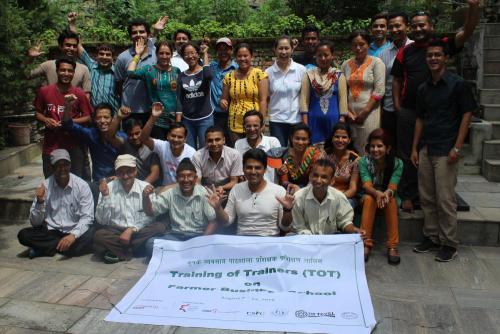
I’ve learned a lot about diversity, collaboration, life and development issues from spending the past seven plus years volunteering/working/living in India and Nepal. I’ve come to realize that in the development sphere it is vital to have a “ground view” understanding of the people that we work with. Ideally this comes through being able to interact with others through their language. However, even with my limited understanding/speaking ability of both Nepali and Hindi I was able to learn a lot through field visits and living like a local in the communities that I visited. This started with my VSO assignment in India when I volunteered, living with a joint family for three years, with the National Trust, Ministry of Social Justice and Empowerment, Government of India and has carried through to my current assignment with World Jewish Relief. Ultimately I found that partnerships with others, including the community members in which I was working, are key to having a positive impact.
With National Trust one of my major roles was that of conducting a variety of capacity building workshops with many of the staff of our 900 partner NGOs. I also worked on a disability awareness raising campaign throughout the country (Badhte Kadam), only made possible through our multiple NGO partnerships. With VSO Nepal my job title was that of Partnership Builder, working on developing Corporate Social Responsibility (CSR) and media relations. At Phul Kumari Mahato Memorial Hospital in Karjanha, Siraha we worked with local schools to educate children about dental health. In my current role with World Jewish Relief we’ve worked with four partner NGOs primarily focusing on livelihood development.
From August 8-12, World Jewish Relief’s NGO partner’s staff from Community Self Reliance Centre (CSRC), Friends Service Council Nepal (FSCN) and Nyayik Sansar (NS), and also staff from Tevel bt Zedak, CORDAID and Parivartan/PATRA will attend a Helvetas Training of Trainers on Farmer Business School. This is a participatory learning approach to enhancing smallholder farmers’ entrepreneurial skills and basic understanding of different issues related to agricultural markets. Since all organisations are working on a market system/connection, business based approach to livelihoods throughout their program areas, it made sense to bring all of the various NGO project staff together to not only learn from the Helvetas staff but to also learn from one another. This Training was also jointly funded in a true collaborative approach.
My hope is that all staff will be on the same page in terms of their learnings and approach to enabling all projects participants to connect to market systems. However this goes much further in that staff will facilitate project participants into incorporating knowledge and using market systems into how they do business, leading to greater incomes, better education, improved healthcare, less poverty and sustainability. This also has the potential, over time, to break down gender, caste and ethnic issues. There is also the possibility of further jobs creation through adding value to products, e.g. establishing a district brand of ketchup made from locally produced tomatoes.
Due to the partnership that we’ve created through the Farmer Business School, the impact of staff learnings and implementation is not limited to only project participants. Nyayik Sansar is the local partner for Tevel bt Zedak and is doing work beyond the NS World Jewish Relief work. CORDAID’s local Parivartan staff are working alongside the CSRC staff in Rasuwa but are also working with other populations. Establishing market systems and making these work for the poor in project areas will be open to any farmer/household that wants to use these for their family benefit, providing greater impact hopefully throughout an entire district, at least throughout a number of VDCs. As an example people bringing their product to a collection point/centre which is part of the system will be more than welcome and encouraged.
The point with partnerships for me is that one builds solid relationships and that they keep expanding to include others, ultimately leading to reaching more people and having greater community impact. However, I know that this isn’t easy as many take a “wait and see” approach and/or want to know “what is in it for them” before collaboration occurs. I understand this about organisations as we all want to promote our good work. But in the end it’s not about “me” it’s about “us” in helping the world to be a better place for all.










Add new comment